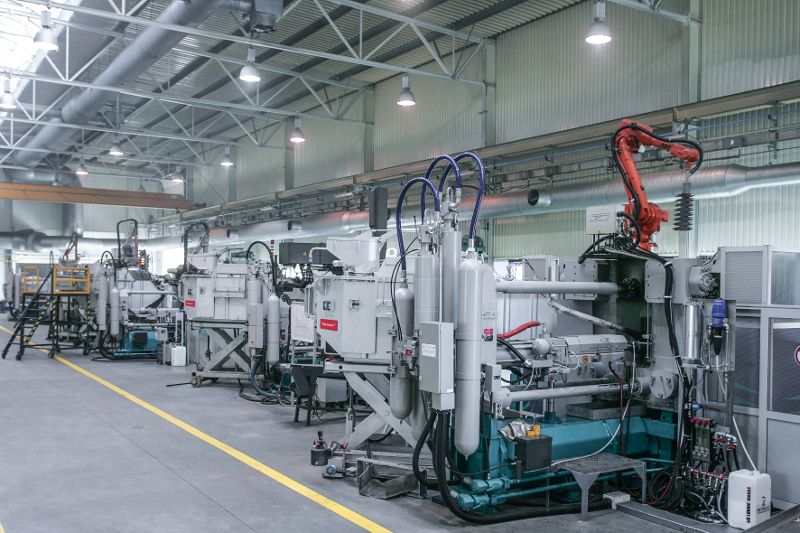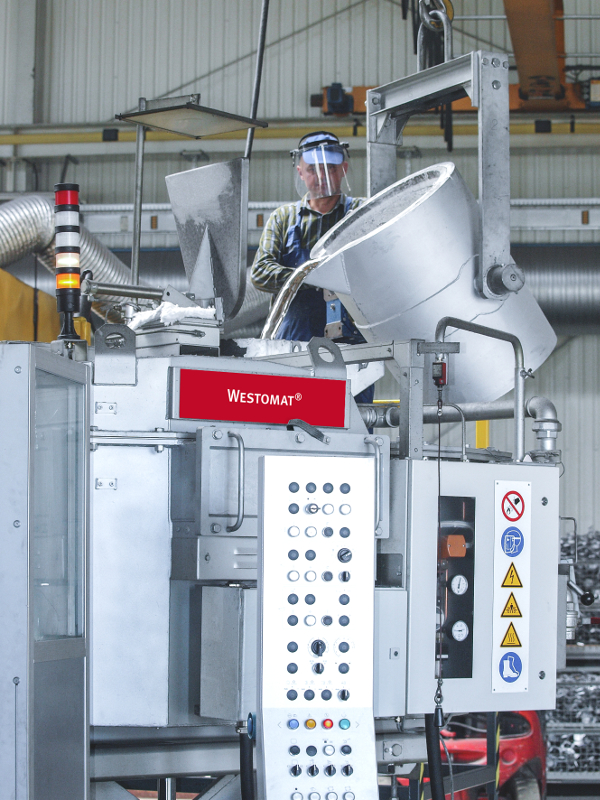Westomat has been selected as the dosing furnace of choice by Polish automotive and electronics parts producer Lenaal following head-to-head equipment analysis under real operating conditions. The foundry singled out the reliable dosing technology, excellent service and rapid supply of spare parts as the key reasons Westomat was the clear winner.
Nine Westomat dosing furnaces from StrikoWestofen underpin die casting operations at Lenaal’s industrial aluminium and zinc parts manufacturing facility in Radom, central Poland.
With the 6,000 square metre plant installing its first Westomat in 2007, engineers at Lenaal have always been strong advocates of the equipment, which they found to be reliable, efficient and easy to maintain.
When the company decided to evaluate how future investments could be maximised, Lenaal had the perfect opportunity to gauge current levels of efficiency and explore whether it would be better to switch to pump-based dosing technology.
A pump-based dosing furnace was installed at the foundry for real-life assessment against the Westomat. Having completed the evaluations, Lenaal concluded that Westomat had excelled rating and therefore solidified its position as the company’s dosing furnace of choice.
Lenaal then replaced the pump-based dosing furnace with another, brand-new Westomat from StrikoWestofen to meet current needs and help realise future ambitions.
Spotlight on reliability
The die casting machines at Lenaal are rarely at a standstill. With the foundry running a three-shift system to cast parts for the automotive and construction industries, each die casting machine has an output of roughly 250 kilograms per hour.
With live operations, genuine demands and actual customer orders to be fulfilled, all dosing technologies met the same conditions and faced the same challenges.
Experts at Lenaal rated the dosing equipment based on system stability, melt quality and process reliability. Metal quality was of a particular importance as it directly impacts product quality and scrap rate.
Theodoor van der Hoeven, Head of Research and Development at StrikoWestofen said: “When liquid aluminium meets air, oxides are formed making it important not to rupture the protective oxide layer on the surface of the melt during dosing. So for systemic reasons, the Westomat removes melt from below the surface of the bath.
“In a dosing pump system by contrast, the liquid metal flows over an edge into the pump and is exposed to the atmosphere again. A transfer process into a pump is not necessary with the Westomat”.
Observations of live operations at Lenaal proved the Westomat from StrikoWestofen to be the superior candidate for dosing reliability and metal quality.
One chamber, numerous advantages: efficient heating, simple cleaning and easy maintenance
Heating efficiency was a critical measure in Lenaal’s performance analysis. Process observations highlighted that the metal heating elements used in furnaces with pump systems are susceptible to damage from splashes of molten metal, whereas the three SiC heating rods used in Westomat dosing furnaces are extremely robust.
Cleaning and maintenance are also huge day-to-day challenges of many foundries.
On all fronts, Westomat’s simple one chamber structure sees it excel. The design means the Westomat has no pump inlet valve that meets liquid metal. As well as reducing machine wear, this means it is not necessary to clean additional chambers or pump pots, while all areas are easy to access.
Theodoor comments: “Minimal maintenance requirements, low wear and the tried-and-tested components of Westomat gives machines a 98% availability rate.
“Plus, if you compare the cleaning requirements for dosing pump and riser tube, the downtime for the Westomat is considerably lower at around 0.043% compared with 0.7% for the dosing pump system.”
The Westomat’s one-chamber system also allows temperature differences to be virtually ruled out which was an advantage to Lenaal. On the flipside, differences of between one and ten degrees can occur in an additional pump pot. These temperature variations affect the flow characteristics of the melt impacting dosing precision and the filling of the mould.
Tomasz Marcela, process engineer at Lenaal added: “As part of our efforts to test, refine and optimise our processes, we tested technologies with a pump system, but the Westomat is the best solution for us. The dosing precision and the lower fluctuations when starting up after the complete cleaning of the furnace were very convincing for us. These properties allow the scrap rate to be reduced too.”
Excellence underpinned by technical support
When comparing the dosing furnaces, Lenaal was not only interested in technology and performance but also in the support services. Here, StrikoWestofen’s repair and maintenance packages, and rapid spare parts supply, provided a great deal of additional assurance to Lenaal.
Having tested the Westomat against alternative dosing technology, Lenaal, which has trusted StrikoWestofen for many years and has two StrikoMelter melting furnaces, now has tangible as well as anecdotal evidence of the quality and lifetime value provided by StrikoWestofen technology.
Tomasz concludes: “Not only does Westomat deliver on technology and reliability – the knowledgeable technicians at StrikoWestofen run a service so efficient that we can plan our maintenance to minimise downtime which leaves us free to focus on delivering quality parts to our customers.
“This company keeps its promises!”
For more information about the Westomat dosing furnace please visit www.strikowestofen.com or call (+49 (0)2261-70910).
| About StrikoWestofen Since 2017 StrikoWestofen has been part of the Norican Group, a world leading provider of technology for the formation and enhancement of metallic parts. The Group is home to four leading, globally operating brands: DISA, Italpresse Gauss, StrikoWestofen and Wheelabrator. Together, they offer customers around the world a broad spectrum of solutions, spanning end-to-end grey iron foundry equipment, integrated light alloy casting solutions, high-end furnace technology for light metal, as well as surface preparation technology and services. Norican Group serves a wide range of industries, including the global automotive, aerospace, foundry and aluminium sectors, through a global network of engineering expertise, manufacturing capacity and local service support. |
|---|


